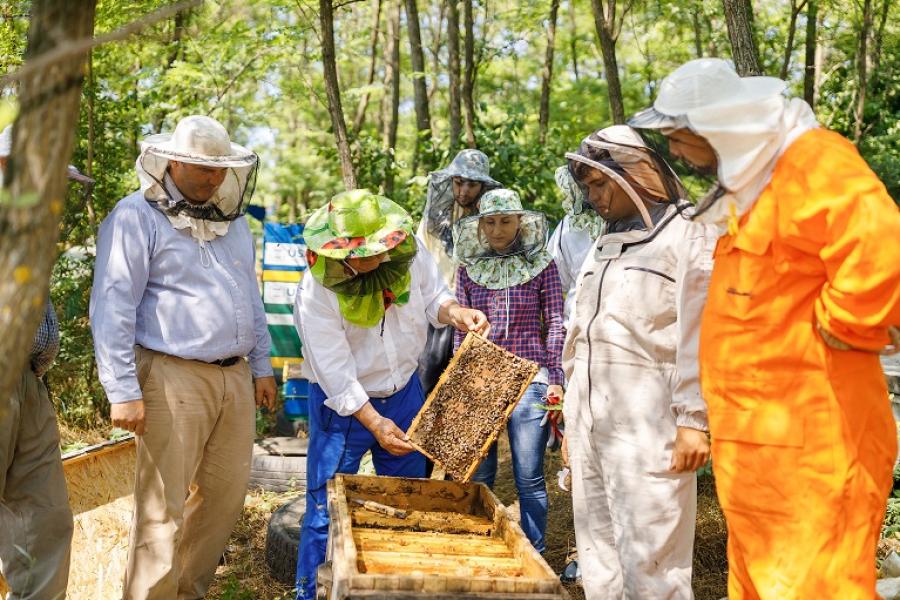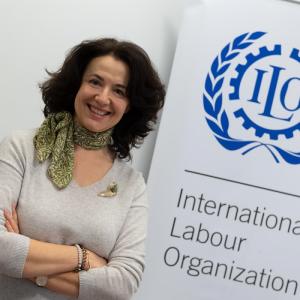ILO Local Employment Partnership creates new jobs for youth in Southern Moldova
11 March 2020
The Local Employment Partnership (LEP) implemented by ILO reached out to 600 young NEETs (youth neither in employment, education or training) in the Cahul region. 282 of them already registered as unemployed to benefit from active labour market measures. To date, this partnership created 135 jobs, 20 start-ups and 2 cooperatives—additional small businesses and jobs are in the pipeline in this rural region where the rate of inactive youth is the highest in Moldova (25%).

Local Employment Partnerships are based on the cooperation of public and private partners trying to find solutions for labour market challenges in their community. In case of Cahul, 20 partners, including educational institutions, micro-finance banks, the employment service, and entreprises came on board. They started to work under the aegis of the Territorial Commission for Consultation and Collective Bargaining, a social dialogue platform of government, trade unions and employers’ organizations that acts as convener of this LEP. The main goal of the partnership was job creation and transition to formal employment for local people in vulnerable situations, especially young people.
The Cahul LEP started as a pilot for Moldova. The region was selected because its employment indicators are poor despite the good potential for economic development. Based on an analysis of local labour market challenges, the LEP identified the necessary interventions that would lead to job creation and formalization and meet local skills demand.
The analysis found that Cahul faces complex labour market challenges.
The analysis found that Cahul faces complex labour market challenges, such as the high incidence of informal and domestic work, disproportionate vulnerability of women and youth, massive emigration, limited access to public employment services, lack of jobs in general, and the lack of education and adequate business trainings for entreprises. To facilitate employment and transitions to formality, the LEP project provides advisory services for local businesses, access to credit, equipment and training, wage subsidies, fosters association building, and outreaches to vulnerable individuals.
The LEP identified 600 young NEETs who could benefit from new opportunities. 282 of them already registered as unemployed giving them access to active labour market measures. To date 135 new jobs were created, including contributing family members. Haralampie Balteanu, who produces hygiene products, used to work with 3 employees. Thanks to the LEP support, he managed to extend his business and created 5 new jobs through wage subsidies provided by the employment office.
To date, 20 young NEETs, including 3 people with disability have launched start-ups in beekeeping.
The Cahul region, with the abundant meadows of the Prut river valley, is made for honey production. After a meticulous training in beekeeping, one of the LEP partners offered to support the 75 young trainees to register their economic activity in apiculture linked with access to grants to develop their own profitable business. To date, 20 young NEETs, including 3 people with disability have launched start-ups in beekeeping.
Read the story of Viorica Anghel, a single mother with a disablity from the village Andrusul de Jos, one of the LEP beneficiaries who completed the LEP training in beekeeping and received 10 bee families and 10 hives to start a business.
Beekeepers set up a new cooperative which is a new business model in the region. In Moldova, there has been a historical reluctance to accept cooperatives, which are associated with the communist kolkhoz system, a form of forced collective farming. At the LEP trainings, participants learned about the values and principles that govern cooperatives, and the added value they bring for members. The beekeepers decided to create one of the first beekeeping cooperatives in the country. The cooperative will promote the bee products. They came up with a common branding and a design for Cahul honey to position it on the market as a high quality product native to the region.
In addition to beekeepers, 10 crafts persons involved in professions such as wood processing, embroidery, or traditional carpet weaving received training with a focus on marketing, financial management and planning. The crafts persons became registered enterprises and can now obtain loans for modernising their business. Currently LEP mostly focuses on job creation in agriculture and crafts but the plan is to provide trainings for young people to prepare them for jobs in the automotive industry.
The LEP Cahul costs 410,000 USD. ILO makes a contribution of 190,000 USD. The Moldovan agency promoting small enterprises provides a grant scheme of 204,000 USD. Additional in kind contributions come from the local municipalities, a micro credit association and a local university.


